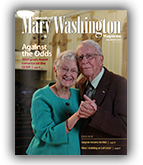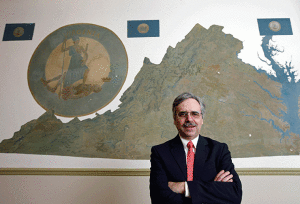An opinion survey conducted for the Center for Leadership and Media Studies brought nationwide attention to the University of Mary Washington this fall as Virginia prepared to elect a new governor.
The surveys show that Virginia, once solidly Republican, is decidedly a “purple” state, said Professor of Political Science and International Affairs Stephen Farnsworth, who designed the survey questions with input from his UMW students.
National media paid attention not only because Virginia was one of just two states this fall with a governor’s race, but also because “Virginia is America in miniature,” Farnsworth said. “We have our liberal Northeast in Northern Virginia. We have our Sun Coast in Virginia Beach. We have our industrial heartland in Hampton Roads, and we have our agricultural and Southern Christian conservatives west and southwest of Interstate 95.”
The survey found that likely voters favored Democrat Terry McAuliffe over Republican Ken Cuccinelli for governor, and that most Virginians support policies that would legalize medical marijuana and expand access to health care.
Seventy-one percent of Virginia adults surveyed would favor a federal law allowing medical use of marijuana with a prescription, and the topic drew majority support among Republicans, Democrats, and independents. And 59 percent said the state should expand access to health care for low-income, uninsured state residents. That proposal is part of the Affordable Care Act, though the question did not mention the law by name or by its nickname, Obamacare.
The Center for Leadership and Media Studies had Princeton Survey Research Associates International conduct the telephone survey of 1,001 Virginia adults from Sept. 25 to 29, 2013.
Besides adding to the public discourse and attracting positive attention to UMW, the survey has helped in the classroom, Farnsworth said. “We have debated the questions and proposed new topics to consider, and I’ve had the students take the survey before it comes out.”
Classes have explored how wording of questions might bias outcomes, giving students a more nuanced view of opinion poll results. The survey has also taught students that their personal experiences don’t necessarily reflect those of other age groups or geographic regions.
“It’s really a great learning tool,” Farnsworth said, “giving people a much better sense of what the entire state of Virginia is like, not just the place they call home.”

